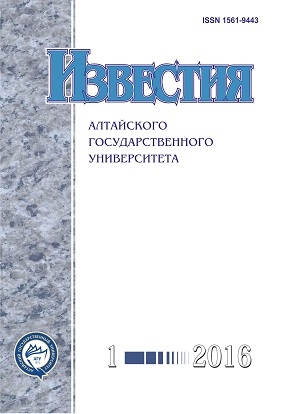The Distribution of Roles in Basic Game-Theoretic Models
Abstract
The paper discusses the problem of roles distribution among participants of organizational systems (OS). Networking cooperation of unequal economic entities is a basis for modern systems organization with every entity taking responsibilities for results, establishing rules of interaction and decision-making by others. In mathematical studies, network organization principles to the fullest extent possible can be implemented in a game theoretical approach. An introduction of an appropriate classification system is necessary due to multiple variants of various game-theoretic models (GTM) describing roles distribution in OS. Roles distribution in OS with fixed number of participants in the proposed GTM classification system is described with a right of the first move (move order) and / or distribution of variables (controls). The following classes are presented: 1) models with a fixed right of the first move and with separated variables; 2) models with a nonfixed right of the first move and with separated variables; 3) models with a fixed right of the first move and with non-separated variables; 4) models with a non-fixed right of the first move and with non-separated variables. Overviews of basic GTM are presented for each class.
DOI 10.14258/izvasu(2016)1-16
Downloads
Metrics
References
Новиков Д.А. Теория управления организационными системами. — 3-е изд. — М., 2012.
Jackson M. Social and Economic Networks. — Princeton University Press, 2008.
Губко М.В., Коргин Н.А., Новиков Д.А. Классификация моделей анализа и синтеза организационных структур // Управление большими системами. — 2004. — Вып. 6.
Новиков Д.А. Сетевые структуры и организационные системы. — М., 2003.
Новиков Д.А. Игры и сети // Математическая теория игр и ее приложения — 2010. — Т. 2, вып. 1.
Губко В.М. Управление организационными системами с сетевым взаимодействием агентов. I. Обзор теории сетевых игр // Автоматика и телемеханика. — 2004. — № 8.
Алгазина Д.Г., Алгазин Г.И. Модельные исследования сетевого взаимодействия на конкурентных рынках с нефиксированными ролями участников. — Барнаул, 2015.
Costa-Gomes M., Iriberri N., Crawford V. Comparing Models of Strategic Thinking in Van Huyck, Battalio, and Beil’s Coordination Games // Journal of the European Economic Association. — 2009. — April — May. — V. 7 (2–3).
Shoham Y., Leyton-Brown K. Multiagent System: Algorithmic, Game-Theoretical and Logical Foundation. — Cambridge University Press, 2009.
Slikker M., Dutta B., Van den Nouweland A. The Potential Maximizers and Network Formation // Mathematical Social Sciences. — 2000. — V. 39, № 1.
Горелов М.А. Модель институционального управления // Управление большими системами. — 2011. — Вып. 35.
Алгазин Г.И. Централизация и децентрализация в базовых игровых моделях организационных систем» // Управление большими системами. — 2012. — Вып. 36.
Izvestiya of Altai State University is a golden publisher, as we allow self-archiving, but most importantly we are fully transparent about your rights.
Authors may present and discuss their findings ahead of publication: at biological or scientific conferences, on preprint servers, in public databases, and in blogs, wikis, tweets, and other informal communication channels.
Izvestiya of Altai State University allows authors to deposit manuscripts (currently under review or those for intended submission to Izvestiya of Altai State University) in non-commercial, pre-print servers such as ArXiv.
Authors who publish with this journal agree to the following terms:
- Authors retain copyright and grant the journal right of first publication with the work simultaneously licensed under a Creative Commons Attribution License (CC BY 4.0) that allows others to share the work with an acknowledgement of the work's authorship and initial publication in this journal.
- Authors are able to enter into separate, additional contractual arrangements for the non-exclusive distribution of the journal's published version of the work (e.g., post it to an institutional repository or publish it in a book), with an acknowledgement of its initial publication in this journal.
- Authors are permitted and encouraged to post their work online (e.g., in institutional repositories or on their website) prior to and during the submission process, as it can lead to productive exchanges, as well as earlier and greater citation of published work (See The Effect of Open Access).








